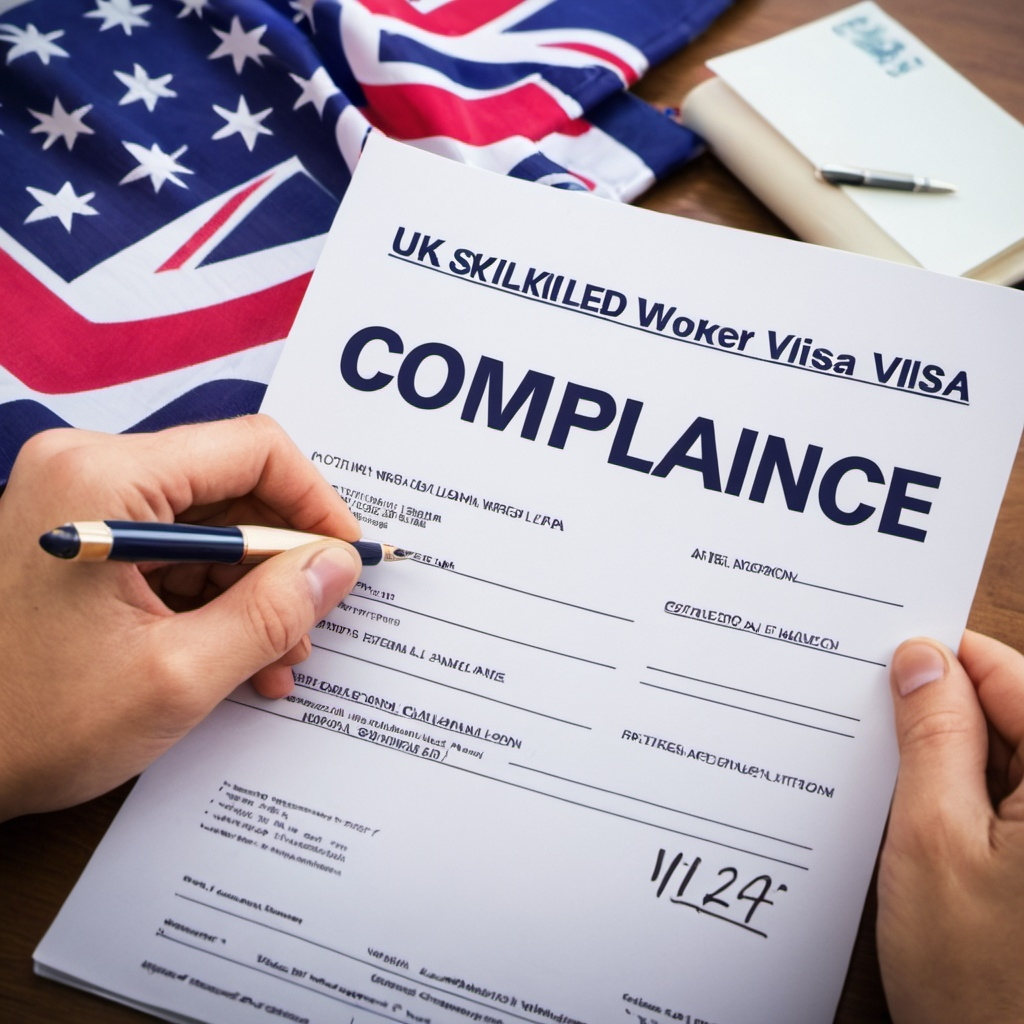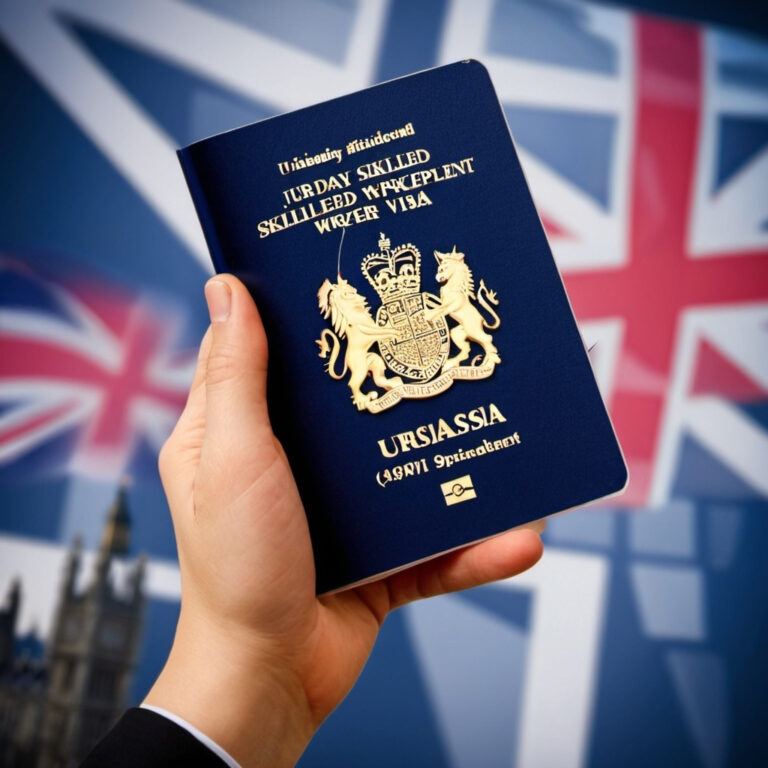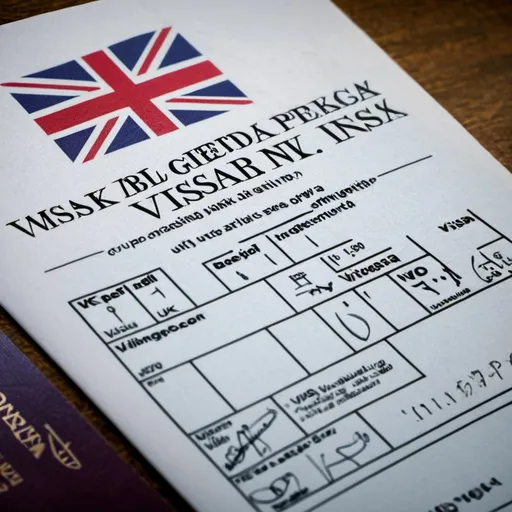UK Skilled Worker Visa Compliance:
The UK Skilled Worker visa is part of the UK’s points-based immigration system, enabling employers to hire skilled workers from outside the UK. For employers, holding a sponsorship license is key to accessing global talent. However, maintaining this license requires strict adherence to compliance obligations set by the UK Home Office.
Compliance plays a crucial role in ensuring the integrity of the UK’s immigration system, and employers who fail to meet these standards face penalties, including fines and the potential loss of their sponsorship license. This comprehensive guide covers everything employers need to know about compliance with the UK Skilled Worker visa, from key responsibilities to potential challenges and penalties
Compliance refers to the rules and obligations that employers must follow when hiring and sponsoring foreign workers under the UK’s Skilled Worker visa. These obligations ensure that employers are hiring legally, protecting the rights of workers, and preventing abuse of the immigration system. To get a detailed eBook on the UK skilled worker visa compliance click here
The UK Home Office sets out specific compliance requirements for employers holding a sponsorship license, which include maintaining accurate records, monitoring employees’ right to work, and reporting relevant changes.
Key Compliance Responsibilities For Employers
Employers with a Skilled Worker visa sponsorship license must meet various compliance obligations. These responsibilities are intended to ensure that all sponsored workers are employed lawfully and that the employer is transparent in its dealings with both the employee and the UK government. To get a detailed eBook on the UK skilled worker visa compliance click here
Record-Keeping
Employers are required to maintain accurate and up-to-date records for each sponsored worker. These records must be available for inspection by the UK Home Office at any time. Key documents employers must retain include:
Right to Work Documentation: A copy of the sponsored worker’s passport, visa, or Biometric Residence Permit (BRP) confirming their right to work in the UK.
Proof of Employment: Copies of employment contracts and details of the worker’s job title, salary, and work hours.
Contact Information Up-to-date addresses and phone numbers for all sponsored employees.
Absence Records: A log of all absences, including holidays, sick leave, and unauthorized absences.
To get a detailed eBook on the UK skilled worker visa compliance click here
Right To Work Checks
Before hiring any foreign worker, employers must conduct right-to-work checks to ensure that the individual is legally allowed to work in the UK. This involves checking and retaining copies of the employee’s immigration documents.
Employers are responsible for repeating these checks if the employee’s visa is time-limited. Failure to perform these checks or to identify when a visa has expired can result in severe penalties.
Monitoring Employee Visa Status
Employers must monitor the visa status of their sponsored workers throughout the employment period. This includes tracking the expiration date of visas and ensuring that the employee remains legally able to work in the UK.
If a sponsored worker’s visa is approaching expiration, the employer should remind the worker to apply for a visa extension or settlement (if eligible). Allowing a worker to continue employment after their visa has expired can lead to fines and revocation of the employer’s sponsorship license.
Reporting Changes To The UK Home Office
Employers are required to report certain changes or events related to the sponsored worker’s employment to the UK Home Office via the Sponsorship Management System (SMS). These changes must be reported within a set timeframe, typically 10 working days.
Examples Of Reportable Changes Include:
Non-attendance: If a sponsored worker fails to start their employment, employers must notify the Home Office within 10 days of the agreed start date.
Termination of Employment: Employers must report if a sponsored worker leaves their role, whether due to resignation, dismissal, or redundancy.
Changes to Employment Conditions, Any significant changes to the worker’s job, such as a change in job title, duties, or salary, must be reported.
Address or Work Location Changes: Changes in the employee’s home address or work location (e.g., moving to a different office or region) must also be reported. To get a detailed eBook on the UK skilled worker visa compliance click here
Compliance with Salary And Job Role Conditions
Sponsored workers must be employed in a job role that meets the minimum skill level required for the Skilled Worker visa (typically RQF Level 3, equivalent to A-Level qualifications) and must be paid at or above the minimum salary threshold set by the UK government.
As of 2024, the general minimum salary requirement for a Skilled Worker visa is £26,200 per year or £10.75 per hour, whichever is higher. However, different salary thresholds may apply for jobs on the Shortage Occupation List (SOL) or if the worker is classified as a “new entrant” to the labor market.
Employers must ensure that the job role and salary offered to the sponsored worker align with the details provided in the Certificate of Sponsorship (COS). Any significant changes to these terms must be reported and may require a new COS.
To get a detailed eBook on the UK skilled worker visa compliance click here
Sponsorship Management System (SMS)
The Sponsorship Management System (SMS) is an online platform that employers use to manage their sponsorship license and sponsored workers. Through the SMS, employers can issue Certificates of Sponsorship (CS), report changes to employment, and update their company’s details.
Key Functions Of The SMS
Assigning a Certificate of Sponsorship (COS): Before hiring a foreign worker, the employer must issue a COS through the SMS. This document serves as confirmation that the employer is offering a genuine job role that meets the visa requirements.
Reporting Changes: Employers must use the SMS to report any changes related to the worker’s employment status or their own business.
Renewing Sponsorship License: Employers must renew their sponsorship license every four years, and this process is managed through the SMS.
Compliance Visits And Audits
To ensure compliance, the UK Home Office may conduct compliance visits or audits, either announced or unannounced. These visits are designed to assess whether the employer is fulfilling their sponsorship duties and to review their records, processes, and systems.
During a compliance visit, Home Office officials may:
Inspect employment records and right-to-work documents.
Interview sponsored workers to verify their job role, working hours, and conditions.
Review the employer’s processes for monitoring visa expiration dates and conducting right-to-work checks.
If the Home Office identifies any areas of non-compliance during the visit, the employer may face penalties or enforcement actions, such as a downgrade of their sponsorship license rating or even revocation of the license.
Penalties For Non-Compliance
Failure to comply with the Skilled Worker visa sponsorship requirements can result in serious consequences for employers. The penalties vary depending on the severity of the breach and can include:
Civil Penalties
Employers found to be employing a worker who does not have the right to work in the UK may face a civil penalty of up to £20,000 per illegal worker.
Suspension Or Downgrade Of Sponsorship License
If an employer fails to meet compliance requirements, their sponsorship license may be downgraded from an “A-rating” to a “B-rating.” Employers with a B-rating must follow a time-limited action plan to restore their rating, and they are unable to issue new Certificates of Sponsorship during this period.
In more serious cases, the sponsorship license may be suspended, which can significantly impact the business’s ability to recruit international talent.
To get a detailed eBook on the UK skilled worker visa compliance click here
Revocation of Sponsorship License
– In cases of severe non-compliance, the Home Office may revoke the employer’s sponsorship license altogether. This means the business will no longer be able to sponsor foreign workers, and any current sponsored employees will have their visas curtailed (shortened).
Criminal Prosecution
– In extreme cases, employers who are found to have deliberately circumvented immigration laws or facilitated illegal working may face criminal prosecution, which could result in fines, imprisonment, or both.
Common Compliance Challenges And How To Overcome Them
While the compliance process may seem straightforward, employers often face challenges in managing their sponsorship obligations. Some common challenges include:
Keeping Track Of Visa Expirations
Employers must monitor the visa status of all sponsored workers to ensure that their right to work in the UK remains valid. Implementing a system that flags visa expiration dates well in advance can help employers avoid accidental non-compliance.
Understanding Reporting Requirements
– Reporting obligations can be complex, especially when dealing with changes in employment status, salary, or job roles. Employers should ensure that their HR team is fully trained on the reporting requirements and has access to the Sponsorship Management System (SMS).
Managing Record-Keeping
– Keeping detailed and accurate records is a critical aspect of compliance. Employers should establish clear internal processes for collecting, storing, and updating relevant employee documents. These records should be easily accessible in the event of a compliance visit.
Navigating Salary Thresholds
– Employers must ensure that the salary they offer meets the minimum threshold for the Skilled Worker visa. This can be challenging in industries where salaries fluctuate or where additional compensation (such as bonuses) is involved. Employers should regularly review salary levels to ensure ongoing compliance.
Compliance with the UK Skilled Worker visa requirements is an essential responsibility for employers looking to hire international talent. While the compliance obligations may seem complex, having the right processes and systems in place can ensure that employers remain compliant and avoid penalties.
To get a detailed eBook on the UK skilled worker visa compliance click here
By adhering to the UK Home Office’s rules on record-keeping, right-to-work checks, reporting changes, and maintaining employee visa statuses, employers can successfully manage their sponsorship duties. Moreover, understanding the potential penalties for non-compliance is critical in safeguarding the business’s ability to recruit and retain skilled workers from overseas.






